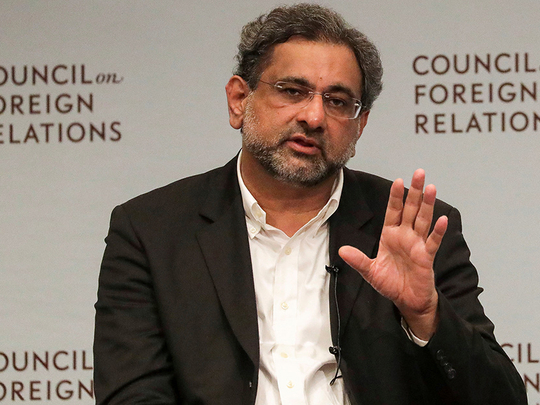
Islamabad/Washington: Pakistan’s new leader, stung by President Donald Trump’s threat to crack down on his country for harbouring terrorists, insisted on Wednesday that Pakistani military forces had uprooted all the sanctuaries used by extremists along its rugged frontier with Afghanistan.
“We have regained control of the area,” the prime minister, Shahid Khaqan Abbasi, said in an interview with The New York Times. “There are no sanctuaries anymore. There are none at all. I can categorically state that.”
The prime minister’s blanket denial of Pakistan’s role as a safe haven could augur a turbulent period in its relations with the United States. The success of Trump’s new strategy for Afghanistan depends on Pakistan playing a more constructive role by depriving militants of the ability to plot and carry out attacks from across the Pakistani border.
“This is a new context,” said President Ashraf Gani of Afghanistan, in a separate interview with The Times. “It provides a new context for Pakistan to seize the opportunity for engagement.” If the Pakistanis did not do more, he said, “there will be consequences.”
But Abbasi’s claim, during his first visit to the United Nations General Assembly, suggested a familiar chasm between how Pakistani and US officials view Pakistan’s responsibility for destabilising Afghanistan. He also denied that Pakistan possesses tactical nuclear weapons — a statement that runs counter to US intelligence assessments.
In the closing days of the Obama administration, the US negotiated with Abbasi’s predecessor, Nawaz Sharif, to try to persuade Pakistan not to deploy these weapons, which US officials said are designed for use on the battlefield against an invading Indian army, and were therefore more at risk of falling into the wrong hands.
“We do not have tactical nuclear weapons,” Abbasi said. “We have short-range nuclear weapons,” which, he said, were not designed for battlefield use and were under the same command and control safeguards as the rest of Pakistan’s nuclear arsenal.
Abbasi, 58, became prime minister in August as a fallback choice after his predecessor, Sharif, decided to leave his brother and preferred successor, Shehbaz Sharif, in a powerful chief minister’s post in Punjab, rather than move him to the capital, Islamabad.
In the interview, Abbasi said the United States did not appreciate the inroads made by Pakistani soldiers against safe havens used by the Pakistani Taliban.
“The general perception in Pakistan was that our efforts were unappreciated, and today, we are being scapegoated,” he said. “We are active partners in the war on terror. No less than that.”
On his visit to New York, Abbasi has confronted the chilly new reality of Pakistan’s relationship with the US. Although he met on Tuesday with Vice President Mike Pence, he did not get a one-on-one meeting with Trump, instead chatting with him at a reception.
During the George W. Bush and Barack Obama administrations, Pakistani leaders met regularly with the president. Obama set up an ambitious strategic dialogue with Pakistan that the Trump administration has not continued. In announcing his Afghanistan policy, Trump made clear that the days of cultivating Pakistan as a partner were over.
Pakistan, he said, has “sheltered the same organisations that try every single day to kill our people. We have been paying Pakistan billions and billions of dollars at the same time they are housing the very terrorists that we are fighting.”
“That will have to change,” he said. “And that will change immediately.”
The president did not specify what punitive measures he had in mind, but other officials have talked about holding up aid or stripping Pakistan of its status as a major non-NATO ally.
The White House recently named Lisa Curtis, an analyst at the Heritage Foundation with a history of strong views on Pakistan, as director for South and Central Asia on the National Security Council.
A report she wrote last February with Husain Haqqani, Pakistan’s former ambassador to Washington, called for the new administration to “avoid viewing and portraying Pakistan as an ally.” If Pakistan did not take steps to show its commitment to America’s counterterrorism goals, Trump should strip it of its non-NATO ally status in six months.
Curtis and Haqqani stopped short of recommending that Pakistan be put on the government’s list of state sponsors of terrorism — as some lawmakers have demanded — at least during the Trump administration’s first year because, they said, it would be too destructive to the relationship. But they said Trump should keep it as an option for later on.
“Pakistan has a long history of denial,” Haqqani said in an interview. “That is more an attempt to deal with a problem of which there is demonstrable proof by managing the narrative.”
— New York Times News Service












